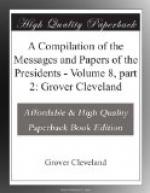I invite the attention of Congress to the recommendations made by the Secretary of the Interior with regard to the preservation of the timber on the public lands of the United States. The protection of the public property is one of the first duties of the Government. The Department of the Interior should therefore be enabled by sufficient appropriations to enforce the laws in that respect. But this matter appears still more important as a question of public economy. The rapid destruction of our forests is an evil fraught with the gravest consequences, especially in the mountainous districts, where the rocky slopes, once denuded of their trees, will remain so forever. There the injury, once done, can not be repaired. I fully concur with the Secretary of the Interior in the opinion that for this reason legislation touching the public timber in the mountainous States and Territories of the West should be especially well considered, and that existing laws in which the destruction of the forests is not sufficiently guarded against should be speedily modified. A general law concerning this important subject appears to me to be a matter of urgent public necessity.
From the organization of the Government the importance of encouraging by all possible means the increase of our agricultural productions has been acknowledged and urged upon the attention of Congress and the people as the surest and readiest means of increasing our substantial and enduring prosperity.
The words of Washington are as applicable to-day as when, in his eighth annual message, he said:
It will not be doubted that, with reference either to individual or national welfare, agriculture is of primary importance. In proportion as nations advance in population and other circumstances of maturity this truth becomes more apparent, and renders the cultivation of the soil more and more an object of public patronage. Institutions for promoting it grow up, supported by the public purse; and to what object can it be dedicated with greater propriety? Among the means which have been employed to this end none have been attended with greater success than the establishment of boards (composed of proper characters) charged with collecting and diffusing information, and enabled by premiums and small pecuniary aids to encourage and assist a spirit of discovery and improvement. This species of establishment contributes doubly to the increase of improvement, by stimulating to enterprise and experiment, and by drawing to a common center the results everywhere of individual skill and observation and spreading them thence over the whole nation. Experience accordingly hath shewn that they are very cheap instruments of immense national benefits.
The preponderance of the agricultural over any other interest in the United States entitles it to all the consideration claimed for it by Washington. About one-half of the population of the United States is




